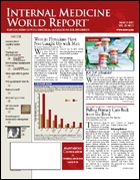Milk, Fruit, and Vegetable Consumption Reduces Functional Activity, Disability
Milk, Fruit, and Vegetable Consumption Reduces Functional Activity, Disability
By John Schieszer
The benefits of a diet rich in fruits and vegetables in general health are not new to physicians. Now, new data from the Atherosclerosis Risk in Communities Study, focusing on the impact of a diet rich in dairy products, fruits, and vegetables on older persons, have shown that functional activity or disability in older persons is directly affected by one’s dietary selections.
“We know that obesity, lack of physical exercise, alcohol consumption, and smoking are modifiable risk factors for disability, but little is known about the role of diet,” said lead investigator Denise Houston, PhD, of Wake Forest University Baptist Medical Center, Winston-Salem, NC.
The study (Amer J Clin Nutrition. 2005;81:515-525), investigated the association between high consumption of dairy products, fruits, and vegetables on functional limitation or disability in black and white Americans. The data were analyzed by race and gender.
All participants (n = 9404; ages, 45-64 years) were randomly selected from Mississippi, Maryland, and Minnesota, and were asked to report on their diets during the previous year, using a 66-item food-frequency questionnaire and self-reports on lower-extremity function as well as activities of daily living (ADLs) and instrumental ADLs.
At the end of 9 years, they were surveyed about their ability to perform 12 ADLs and instrumental ADLs. For all participants, increased consumption of these foods was inversely associated with a lower risk for functional limitation or disability, even after adjusting for age, education, smoking, and body mass index.
However, the risk reduction was greatest among black women, resulting in at least a 30% reduction in functional activity limitation or disability than those who consumed the lowest amounts of these foods.
The median servings for those consuming the highest amounts of these foods were: dairy, 2 servings; fruit, 3 servings; vegetables, 3 servings. Current recommendations call for 3 cups/day of low-fat or fat-free dairy products, 2 cups (4 servings) of fruit, and 2.5 cups (5 servings) of vegetables.
This is the first study to report an association between functional limitation or disability and eating certain foods, Dr Houston noted. Although it is not clear why these foods may improve functional ability, Dr Houston suggests that the calcium and vitamin D in dairy foods may decrease the risk of disability associated with osteoporosis and decreased muscle strength; in addition, the antioxidants found in fruits and vegetables may reduce the build up of oxidative damage in tissue, thereby slowing functional disability often associated with aging and decreasing the risk of chronic diseases that can also lead to disability.
